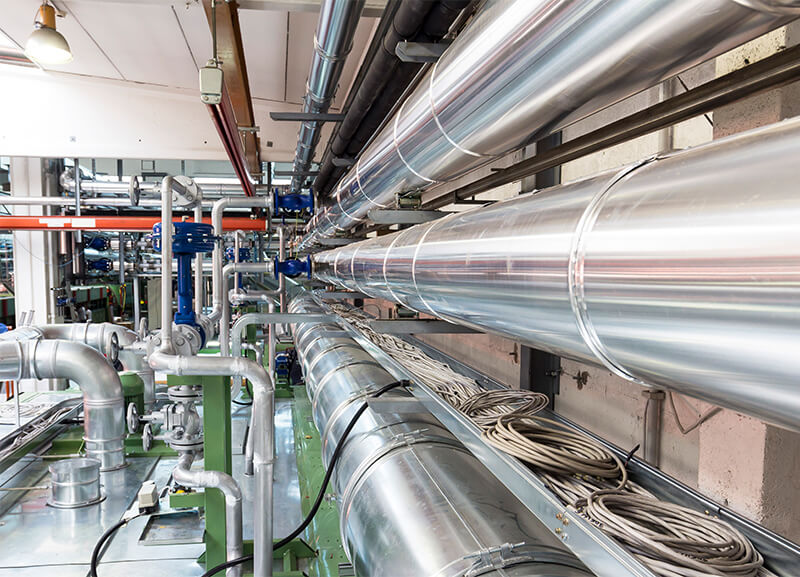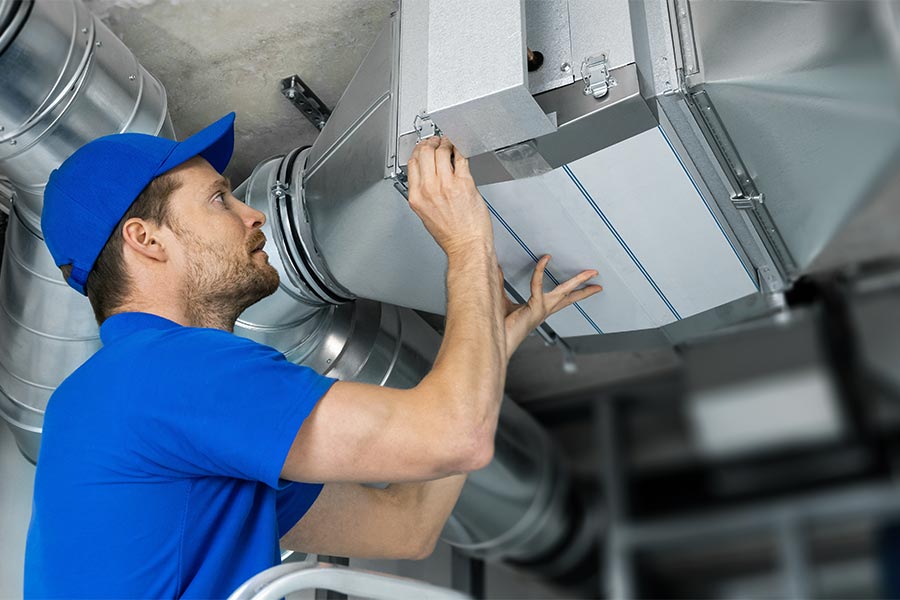See how HVAC experts help maintain sustainable systems in every climate
Wiki Article
Checking Out the Crucial Elements of an Efficient A/c System
An effective heating and cooling system is developed on several vital elements that operate in harmony. Each component, from the thermostat to the ductwork, plays a crucial role in maintaining comfort and energy performance. Understanding these elements is important for optimizing performance and boosting indoor air quality. As one takes a look at these components, the elaborate connections in between them reveal insights right into improving overall system performance. What certain factors add most to this performance?The Role of the Thermostat in HVAC Efficiency

Although commonly ignored, the thermostat plays an essential duty in the effectiveness of a/c systems. HVAC experts. This little tool functions as the main nerve center, controling temperature level settings and making sure excellent convenience within a room. By precisely sensing the ambient temperature level, the thermostat interacts with the air flow, home heating, and air conditioning units to preserve the desired climate
A reliable thermostat lessens energy usage by activating the a/c system just when required, thus avoiding excessive home heating or cooling. Modern wise and programmable thermostats enhance this effectiveness further by allowing customers to set timetables and from another location readjust setups, adapting to day-to-day routines.
The positioning of the thermostat is vital; inappropriate area can lead to inaccurate temperature analyses, resulting in ineffective operation. In general, a well-functioning thermostat not only improves comfort yet likewise contributes significantly to power savings and the durability of the heating and cooling system.
Understanding the Relevance of Air Filters
Air filters offer an important feature in HVAC systems by guaranteeing that the air distributing within a space stays healthy and balanced and clean. These filters trap dust, irritants, and other toxins, preventing them from being recirculated throughout the setting. By catching these fragments, air filters add to improved interior air top quality, which can substantially profit owners' wellness, especially those with allergies or respiratory conditions.In addition, preserving clean air filters boosts the performance of a/c systems. Stopped up filters can restrict airflow, triggering the system to work harder to maintain desired temperatures, bring about boosted energy usage and greater utility bills. Regularly replacing or cleansing filters is an essential upkeep action that can prolong the life expectancy of a/c equipment. Eventually, understanding the significance of air filters permits house owners and building managers to take proactive measures to ensure a well-functioning, effective a/c system that promotes a secure and comfy interior environment.

The Capability of the Heater and Warmth Pump
Furnaces and warm pumps are essential elements of HVAC systems, accountable for giving heat throughout chillier months. Heaters operate by heating air through combustion or electric resistance, then dispersing it throughout the home by means of ducts. They usually supply rapid home heating and can be fueled by natural gas, electricity, or oil, relying on the system kind.Conversely, heatpump move warmth as opposed to generate it. They draw out warmth from the outdoors air or ground, also in reduced temperatures, and transfer it indoors. HVAC experts. This twin performance permits warmth pumps to likewise give cooling in warmer months, making them flexible options for year-round climate control
Both systems need correct upkeep to guarantee effectiveness and long life. While furnaces excel in extreme chilly, heatpump can be advantageous in modest environments. Comprehending their unique performances aids property owners in choosing the most suitable alternative for their heating needs.
Exploring the Air Conditioning System
The a/c system is a crucial component of heating and cooling systems, readily website available in various kinds to fit different requirements. Comprehending the performance scores of these devices is important for making educated choices concerning power usage and price. This area will certainly discover the diverse kinds of ac unit and clarify just how efficiency scores effect efficiency.Sorts Of Air Conditioners
While numerous variables influence the choice of a/c systems, recognizing the different kinds available is crucial for homeowners and structure supervisors alike. Central air conditioning conditioners are developed to cool entire homes or buildings, making use of a network of ducts for air flow. Window devices provide a more local service, suitable for solitary spaces or little areas. Portable a/c unit offer adaptability, enabling customers to move the device as needed. Ductless mini-split systems are an additional choice, incorporating the performance of central systems with the convenience of zoning, as they need no ductwork. Lastly, geothermal systems harness the earth's temperature for energy-efficient cooling. Each kind comes with distinct benefits, making notified options important for efficient climate control.
Efficiency Scores Clarified
Understanding performance rankings is vital for choosing the right cooling device, as these metrics give understanding into the system's efficiency and energy intake. The most typical score for air conditioning system is the Seasonal Energy Effectiveness Ratio (SEER), which gauges the cooling output throughout a typical cooling season divided by the overall electrical power input. A greater SEER indicates better effectiveness. Furthermore, the Power Effectiveness Proportion (EER) is used for gauging performance under particular problems. One more vital metric is the Power Star certification, which symbolizes that an unit satisfies strict power performance standards. By reviewing these ratings, consumers can make enlightened options that not just optimize comfort however additionally minimize energy costs and environmental influence.The Value of Ductwork and Air movement
Effective ductwork layout and airflow administration play important functions in the overall effectiveness and performance of a/c systems. Appropriate ductwork assurances that conditioned air is distributed uniformly throughout an area, lessening temperature level variations and improving comfort. Properly designed air ducts minimize resistance to air flow, decreasing the work on heating and cooling equipment and inevitably lowering energy intake.Airflow monitoring entails strategically positioning vents and registers to improve the circulation of air. This prevents common concerns such as chilly or warm spots, which can happen when air flow is blocked or inadequately balanced. In addition, the appropriate duct products and insulation can better boost efficiency by decreasing warm loss or gain during air transit.
An efficient ductwork system not just adds to energy savings however can also lengthen the life-span of heating and cooling devices by lowering unneeded pressure (HVAC experts). Understanding the significance of ductwork and air movement is essential for attaining peak A/c system efficiency.
Routine Maintenance Practices to Boost Performance
Routine upkeep practices are important for ensuring peak efficiency of heating and cooling systems. These practices consist of regular evaluations, cleaning, and necessary repair services to keep the system running efficiently. On a regular basis altering air filters is important, as stopped up filters can obstruct air movement and reduce efficiency. Furthermore, technicians need to examine and tidy evaporator and condenser coils to stop overheating and energy waste.Annual specialist assessments are likewise suggested, as skilled professionals can determine prospective issues before they intensify. Lubricating moving parts minimizes wear and tear, contributing to a longer lifespan for the system. Furthermore, making sure that the thermostat operates properly aids in maintaining perfect temperature level control.

Frequently Asked Concerns
Just how Frequently Should I Replace My Thermostat?
Thermostats ought to usually be changed every 5 to 10 years, depending upon use and modern technology improvements. Regular checks are recommended to ensure peak performance, specifically if experiencing irregular temperature control or boosted energy expenses.What Size Air Filter Is Ideal for My Heating And Cooling System?
The ideal dimension air filter for a cooling and heating system varies by unit design. Generally, it's vital to consult the proprietor's guidebook or inspect the existing filter measurements to assure peak efficiency and air high quality.Can I Mount a Warm Pump Myself?
Mounting a heatpump individually is possible for skilled people, however it requires understanding of electric systems and local codes. Employing a specialist is recommended to ensure appropriate setup and suitable system efficiency.Exactly how Do I Know if My Ductwork Is Reliable?
To figure out ductwork effectiveness, one need to look for leakages, step airflow at vents, check insulation top quality, and assess temperature level differences in between supply and return ducts. Expert analyses can provide extensive insights right into general performance.What Are Signs My Cooling And Heating Demands Immediate Maintenance?
Indications that an a/c system needs prompt upkeep consist of uncommon noises, irregular temperature levels, increased energy costs, unpleasant odors, and regular cycling. Dealing with these concerns quickly can prevent additional damage and guarantee height system performance.Air filters serve a necessary feature in Cooling and heating systems by ensuring that the air distributing within a space continues to be tidy and healthy and balanced. Furthermore, maintaining tidy air filters boosts the performance of HVAC systems. Ductless mini-split systems are another alternative, combining the performance of main systems with the benefit of zoning, as they require no ductwork. Understanding efficiency ratings is important for selecting the best air conditioning system, as these metrics give understanding into the system's performance and power consumption. The finest size air filter for a Cooling and heating system differs by unit design.
Report this wiki page